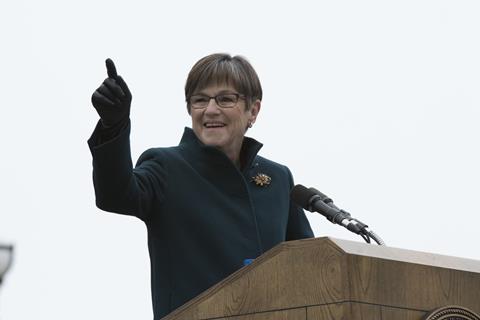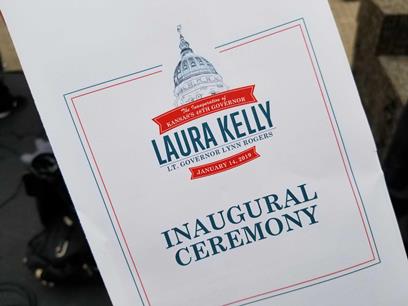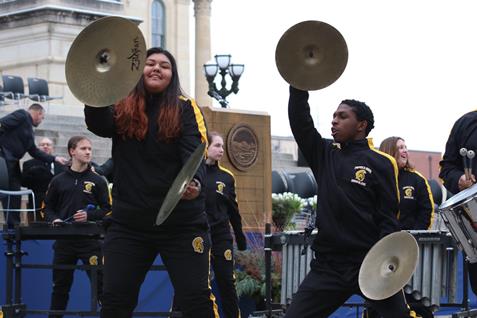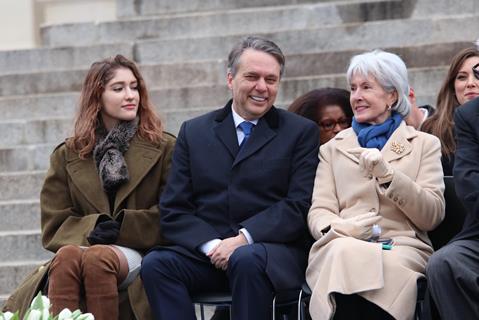
by Stephen Koranda and Scott Canon, Kansas News Service
Kansas swore a new governor into office on Monday and saw the end of eight years of Republicans in the office.
New Democratic Gov. Laura Kelly told supporters, and the Republican lawmakers she’s sure to clash with, that the state had lost its sense of community. That seemingly was a dig at predecessors Sam Brownback and Jeff Colyer.
“Somewhere along the way, (the) spirit of neighbor-helping-neighbor that runs so strong in our communities failed to extend into this building,” Kelly said in her inauguration address from the steps of the Capitol.
“Public service began to give way to partisanship,” she said. “Kansas lost its sense of self. Its sense of community. We can’t let that happen again.”
In the months since her election, she’s said her most pressing tasks revolve around reconstructing agencies that build roads, look after children in crisis, man prisons and care for the needy in Kansas.
Kelly brings years of state government know-how with her to the governor’s office. What’s less certain is her ability to bend a Republican majority in the Legislature to her priorities.
Her inauguration speech steered away from specifics. Instead, she aimed for a rhetorical stab at uniting a polarized Statehouse, and the interest groups tugging it this way and that, toward a sense of common purpose.
“The values that shaped our very foundation are being tested. The ideals that bind us are being strained,” she said. “Sometimes it can feel like the forces of division are succeeding. But it’s at these very moments … that Kansans always shine.”
Still, she often phrased those goals of shared purpose, and the way she sees Kansas culture, in the language of Democrats.
“We want to know that our hard work will be respected … with a fair and liveable wage and a chance to grow,” she said. “We want to know that good health care will be there when we need it and getting sick won’t mean a second mortgage or, worse, homelessness.”
That was as close as she got to pressing a policy change. It was a veiled reference to one of the chief fights sure to define the legislative session getting underway this month.
Kelly’s initiatives will start with a push to expand Medicaid to an added 150,000 Kansans who make too little money to qualify for federal subsidies for insurance coverage and too much money to qualify for government-paid plans.
The Legislature didn’t even try to pass expansion last year after failing to overcome a Brownback veto the year before.
With Kelly in office, mere passage by the House and Senate would clear the way. Democrats and moderate Republicans believe they have the votes. Whether Republican leaders will bring the legislation to the floor could test her ability to move the Legislature from her seat in the executive branch.
It’s just one of a handful of contentious issues that could strain relationships with lawmakers for the newly minted governor who turns 69 this month.
She represented parts of Topeka from 2005 through 2018.
“I wasn’t born into politics,” she said Monday. Rather, as the daughter of a career military officer, Kelly said, “I was born into public service.”

She played a part in budget-writing and tax bills as the top-ranking Democrat on the Senate Ways and Means committee. That position gave Kelly her party’s proxy when it came to writing budgets and negotiating final spending compromises.
Kelly positioned herself as a moderate Democrat and represented a Republican-leaning district. She’s touted her support for the Second Amendment and voted with Republicans on some gun issues, although she now says the Legislature — with votes from her — went too far at times in making it easy for Kansans to carry guns almost anywhere even when they lack a permit.
She openly criticized the state’s 2012 tax cuts pushed through by Brownback and the fiscal strain they caused for the state budget in the years that followed.
The Legislature raised tax rates nearly to where they were before in 2017. That, combined with an economic recovery, pulled the state away from financial crisis.
But Kelly has contended the years of steep funding cuts to state agencies left lasting scars, including an exodus of talent. Spending on roads suffered to prop up other state services.
Changes to law offered welfare benefits to fewer Kansans. And the Department for Children and Families — much like its counterparts across the country — has struggled to keep kids safe or even find temporary lodging for them under ballooning caseloads.

Kelly has pledged to reach out to Republicans. House Speaker Ron Ryckman, who represents the conservatives in the GOP, said she won’t have a choice.
“With a majority of Republicans in both chambers, any bill that comes in front of her desk will be bipartisan,” he said. “Everything she does will be bipartisan.”
It will have to be.
Lawmakers will see her first real work later this week when she delivers a State of the State address and reveals the budget she’s been crafting since her November win over Republican Kris Kobach.
Kobach had vowed to return to the tax-cutting ways of the Brownback years. He’d argued the biggest problem with what that Republican administration did came from its lack of boldness in trimming back the size of state government.
In contrast, Kelly’s likely to search for more sources of revenue. She’s been coy so far about whether she’ll favor rewriting state tax law to return some revenue to a minority of filers who end up paying more to the state as a result of Trump administration federal tax cuts made in 2017.
The state could also legalize sports betting as another way to boost tax revenue.
Jeff Longbine, the moderate Republican vice president of the Senate, said Kelly will still need to be frugal.
“We’ve worked really, really hard over the last couple years to get the state back on some sound fiscal footing,” he said. “If we’re going to spend money, I think we need to do it very prudently.”
The state needs to catch up on set-asides for future government pension obligations and road building, he said.

Whatever happened to state agencies and state spending reserves took years, he said. Kelly, he said, shouldn’t try to reverse everything in 12 months.
“As we look into the future,” he said, “what can we accomplish this year? What may we be able to accomplish next year?”
Democrats will still have a minority in both chambers, but their influence could grow this session with a Democrat once again holding the governor’s office.
Senate Democratic Leader Anthony Hensley is one of the lawmakers who will have the ear of the new governor. Having her support on issues could help Democrats shepherd compromises that attract Republicans to reach a majority vote.
“We’re going to be more proactive,” he said, “as opposed to reactive.”
Stephen Koranda is Statehouse reporter for the Kansas News Service, a collaboration of KCUR, Kansas Public Radio, KMUW and High Plains Public Radio covering health, education and politics. Follow him on Twitter @kprkoranda.
Scott Canon is managing editor of the Kansas News Service You can reach him on Twitter @ScottCanon
Kansas News Service stories and photos may be republished at no cost with proper attribution and a link to ksnewsservice.org.
See more at https://www.kcur.org/post/first-day-governor-kelly-says-partisanship-cost-kansas-its-sense-self

